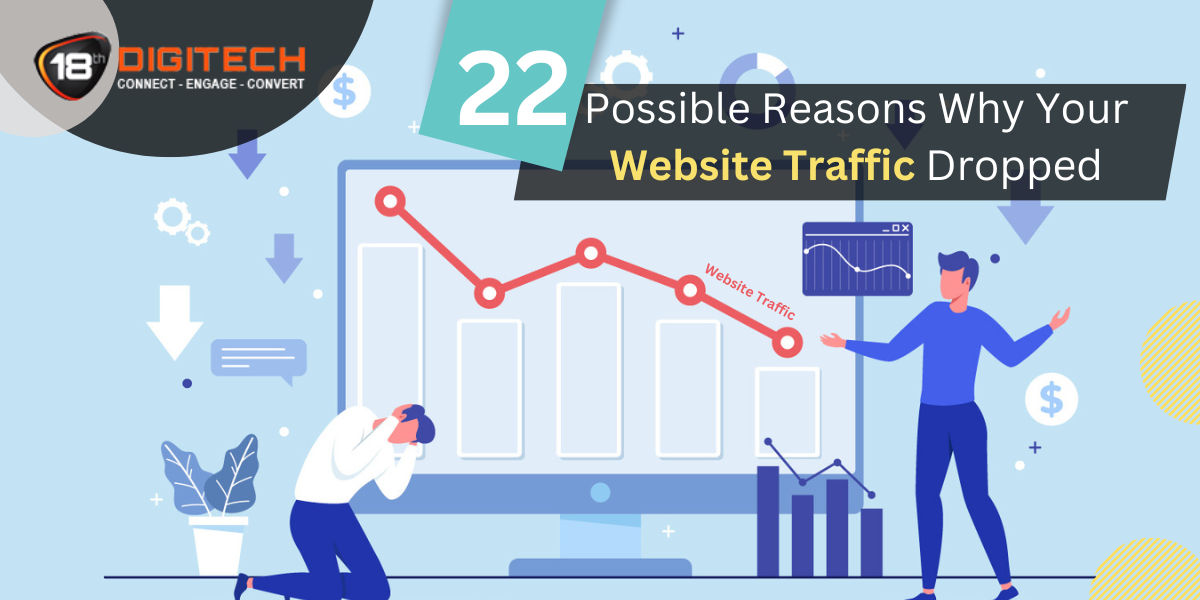Encountering an abrupt decline in website traffic can be both perplexing and worrisome for online businesses and website owners alike. In the dynamic digital landscape characterized by intense competition and elevated user expectations, the ability to discern the underlying causes behind a drop in traffic is paramount for effective troubleshooting. As the online realm constantly evolves, staying attuned to the nuances of user behavior, search engine algorithms, and industry trends becomes crucial. Armed with this understanding, businesses can adopt proactive measures to address challenges promptly, ensuring the sustained growth and relevance of their online presence. In essence, the comprehension of traffic fluctuations serves as a linchpin for devising strategic solutions and maintaining a resilient and thriving digital existence.
In this blog, we’ll explore 22 potential factors that could be contributing to the decrease in your website traffic and provide insights on how to address them.
But first, let’s define-
Website Traffic
Website traffic refers to the total number of visitors that access a particular website over a specified period. It is a fundamental metric in assessing a website’s popularity, reach, and overall performance.
Several factors contribute to website traffic, influencing the volume and nature of visitors:
- Search Engine Optimization (SEO): A well-optimized website is more likely to appear prominently in search engine results, attracting organic traffic based on relevant keywords and content.
- Content Quality: Engaging, informative, and regularly updated content captivates visitors, encouraging them to stay longer on the site and explore further.
- Social Media Presence: Active participation and promotion on social media platforms can drive traffic as users click through to the website from shared links or posts.
- Marketing and Advertising: Paid advertising campaigns and effective marketing strategies can significantly boost website traffic, especially when targeting specific demographics.
- Backlinks and Referrals: High-quality backlinks from reputable websites and referrals from other platforms contribute to a website’s credibility and visibility.
- User Experience (UX): A well-designed and user-friendly website enhances the overall experience, keeping visitors engaged and encouraging them to return.
- Mobile Optimization: With the increasing use of mobile devices, ensuring that a website is optimized for various screen sizes and devices is essential for attracting and retaining traffic.
- Page Load Speed: Faster loading times improve user experience and can positively impact a website’s search engine rankings, influencing the likelihood of attracting more visitors.
- Email Marketing: Leveraging email campaigns can drive traffic by directing subscribers to specific pages, promotions, or new content on the website.
- Online Presence and Branding: Establishing a strong online presence through consistent branding, both on and offline, contributes to increased recognition and traffic.
- Local SEO: For businesses with physical locations, optimizing for local search helps attract nearby customers searching for relevant products or services.
- Security and Trustworthiness: Secure websites with proper SSL certification build trust with visitors, positively influencing the likelihood of repeat traffic.
- Promotions and Discounts: Offering promotions, discounts, or exclusive deals can attract visitors seeking value, leading to increased website traffic.
- Community Engagement: Actively participating in online communities, forums, or discussion groups related to the website’s niche can drive traffic through shared interests.
- Trends and Seasonality: Aligning content with current trends or seasonal themes can capitalize on increased user interest during specific periods.
22 Reasons Why Your Website Traffic Dropped
- Algorithm Changes: Search engines regularly update their algorithms. If your website isn’t aligned with the latest criteria, it might experience a drop in search engine rankings and, consequently, a decrease in traffic.
- Technical Issues: Technical glitches like broken links, server problems, or slow page loading can frustrate users, leading to a negative experience and a subsequent decline in traffic.
- Mobile Compatibility: As mobile usage continues to rise, a lack of mobile optimization can result in a poor user experience for mobile visitors, impacting your search rankings and overall traffic.
- Content Quality: Outdated, irrelevant, or low-quality content can cause visitors to lose interest. Regularly updating and improving your content is essential for maintaining user engagement.
- Keyword Relevance: Changes in user search trends or outdated keyword strategies can cause a misalignment between user queries and your content, affecting organic traffic.
- Competitor Actions: Shifts in your competitors’ strategies or the entry of new competitors can influence your website’s relative appeal, affecting your traffic.
- Social Media Strategy: Social media is a powerful traffic source. Inconsistent or ineffective social media strategies can lead to decreased visibility and reduced traffic to your website.
- Security Concerns: Users are increasingly conscious of online security. A lack of proper security measures, like SSL certificates, can lead to a loss of trust and reduced website traffic.
- Content Freshness: Regularly updating your content not only keeps users engaged but also signals to search engines that your website is relevant, contributing to higher rankings and increased traffic.
- Backlink Quality: Low-quality or spammy backlinks can negatively impact your website’s credibility and, subsequently, its visibility in search engine results.
- User Experience (UX): A positive user experience is paramount. Poor navigation, slow loading times, or confusing layouts can drive visitors away, reducing overall traffic.
- Website Redesign: Changes in website design can temporarily disrupt user familiarity. If not executed with consideration for user experience, it can lead to a short-term drop in traffic.
- Hosting Problems: Issues with your hosting provider, such as slow performance or frequent downtime, can result in a poor user experience and negatively impact website traffic.
- Search Engine Penalties: Violations of search engine guidelines, such as engaging in black-hat SEO practices, can lead to penalties, reducing your website’s visibility and traffic.
- Duplicate Content: Search engines penalize duplicate content. Ensuring your content is unique and avoiding duplication is crucial for maintaining search engine rankings and traffic.
- Conversion Funnel Problems: Obstacles or friction in the user journey, such as a confusing checkout process, can result in a drop in conversions and, consequently, traffic.
- Local SEO Neglect: For businesses with a local focus, neglecting local search optimization can cause a decrease in visibility within your target geographic area.
- Ineffective Call-to-Actions (CTAs): Well-placed and compelling CTAs guide users through your website. Ineffectively designed or positioned CTAs may result in missed opportunities for engagement and conversions.
- Browser Compatibility: A website that isn’t compatible with different browsers may lead to a poor user experience, causing visitors to leave and reducing overall traffic.
- Lack of Social Proof: Social proof, such as testimonials or reviews, builds trust. A lack of social proof can impact user confidence, affecting the traffic your website receives.
- Inadequate Marketing: Lack of promotion or marketing efforts can result in decreased visibility. A robust marketing strategy is essential for attracting and retaining website traffic.
- External Factors: Economic downturns or shifts in industry trends can influence user behavior. Adapting to these external factors is essential to maintaining or increasing website traffic in changing circumstances.
Tips to Maintain Website Traffic
Maintaining consistent website traffic requires a strategic and proactive approach. Here are several tips to help you sustain and even increase your website traffic over time:
- High-Quality Content: Regularly produce valuable, relevant, and high-quality content. This not only attracts new visitors but also encourages repeat visits and establishes your website as a reliable resource.
- SEO Optimization: Stay updated on search engine algorithms and optimizes your content for relevant keywords. Ensure proper Meta tags, headers, and other on-page SEO elements to enhance search engine visibility.
- Mobile Optimization: With the growing prevalence of mobile users, ensure your website is mobile-friendly. Responsive design and fast loading times on mobile devices contribute to a positive user experience.
- Social Media Engagement: Maintain an active presence on social media platforms. Share your content, interact with your audience, and use social media advertising to reach a broader audience.
- Email Marketing: Cultivate and nurture an email subscriber list. Regularly send out newsletters, promotions, and updates to keep your audience engaged and drive traffic to your site.
- Backlink Building: Focus on building high-quality backlinks from reputable sources. Collaborate with others in your industry, guest post, or engage in outreach to enhance your website’s authority.
- User Experience (UX): Continuously optimize your website for a positive user experience. Ensure easy navigation, fast loading times, and clear calls-to-action to keep visitors engaged.
- Analytics and Monitoring: Utilize analytics tools to monitor website traffic trends. Regularly review metrics like page views, bounce rates, and user demographics to identify areas for improvement.
- Community Engagement: Actively participate in online communities, forums, and discussions relevant to your niche. Engaging with your community helps build credibility and can drive organic traffic.
- Local SEO: If applicable, optimize your website for local search. Create a Google My Business profile, obtain local reviews, and ensure accurate business information for increased local visibility.
- Regular Updates and Maintenance: Keep your website’s software, plugins, and security measures up to date. Regular maintenance prevents technical issues that could impact user experience and traffic.
- Content Diversification: Experiment with different types of content such as videos, infographics, podcasts, and interactive elements. Diversifying your content keeps your audience engaged and attracts new visitors.
- Promotions and Campaigns: Run periodic promotions, discounts, or campaigns to attract attention and drive traffic. Limited-time offers can create a sense of urgency among visitors.
- Influencer Collaborations: Collaborate with influencers or thought leaders in your industry. Their endorsement or collaboration can introduce your website to a new and wider audience.
- Remarketing Strategies: Implement remarketing strategies to re-engage visitors who have previously interacted with your website. This can be done through targeted ads on various platforms.
- Social Proof: Showcase social proof in the form of testimonials, reviews, and case studies. Positive feedback builds trust and encourages new visitors to explore your website.
- Interactive Features: Incorporate interactive features like quizzes, polls, or surveys. Such elements can enhance user engagement and encourage sharing, leading to increased traffic.
- Strategic Partnerships: Form partnerships with complementary businesses or websites. Cross-promotion can introduce your site to a new audience.
- Adapt to Trends: Stay current with industry trends and user preferences. Adapting your content and strategies to evolving trends can help maintain relevance and attract traffic.
- Employee Advocacy: Encourage employees to share your content on their personal social networks. This can amplify your reach and bring in new visitors.
Wrapping Up,
Identifying the reasons behind a drop in website traffic is the first step towards revitalizing your online presence. Regularly assess and update your strategies, staying attuned to industry trends and user expectations. By addressing these 22 potential factors, you can navigate the challenges of the digital landscape and optimize your website for sustained success.
For a boost in website traffic, reach out to us at 18th DigiTech, your premier digital marketing agency in India. Our team of experts is ready to elevate your online presence!









 About 18th Digitech
About 18th Digitech Awards and Credentials
Awards and Credentials Our Partners
Our Partners
